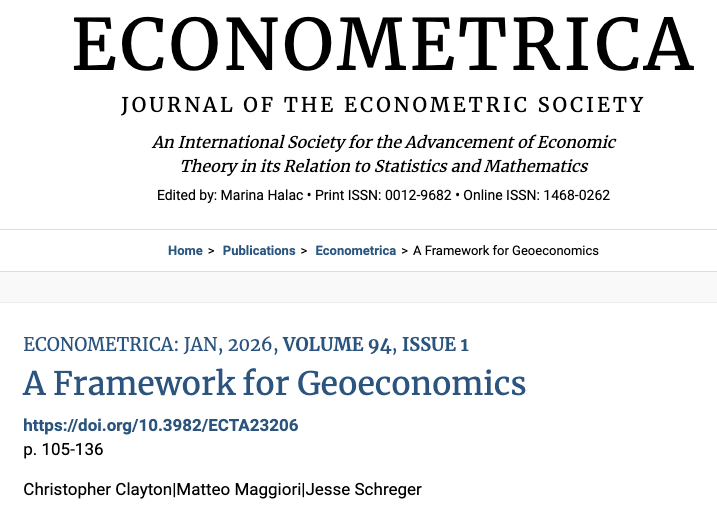OUR AIM IS TO SHED LIGHT ON THE MOST PRESSING GLOBAL ECONOMIC CHALLENGES TO IMPROVE INTERNATIONAL ECONOMIC POLICY

Updates
Our paper “A Framework for Geoeconomics” by Christopher Clayton, Matteo Maggiori, and Jesse Schreger has been published in the Econometrica, Volume 94, 2026.
The agenda for the the JIE-GCAP-BGS Conference is now available. It can be viewed here or on the event website.
We are excited to release a public, research-ready dataset for macroeconomics and finance built from SEC Form N-PORT mutual fund filings. What’s inside: Complete holdings at the security level for U.S. mutual funds and ETFs each quarter.
The Global Capital Allocation Project, Stanford Business, Government, and Society Initiative, and the Review of Financial Studies will convene a research conference on the geoeconomics of financial markets at the Stanford GSB on May 15, 2026.
More details here: https://www.globalcapitalallocation.com/geofinmkt.
Matteo Maggiori gave a lunchtime plenary on Geoeconomics at The Econometric Society 2025 World Congress in Seoul. Slides from the session are available here.
We are organizing the third annual GCAP conference on international economics and finance, to take place in person at Columbia University in New York on October 17. For more information, see the call for papers.
In the News
“The geoeconomic competition between the United States and China is not a passing phase but a likely defining feature of the years ahead. Korea's success will depend on how skillfully it navigates these treacherous waters.”
“A diferencia de la Guerra Fría, donde los países debían elegir entre Estados Unidos y la Unión Soviética, el actual conflicto comercial entre Washington y Beijing no obligará a Chile a escoger un bando. Esa es la visión de Matteo Maggiori, profesor de Finanzas en la Stanford Graduate School of Business, quien descarta la idea de una división del mundo en bloques comerciales antagónicos.”
“Geoeconomics, the strategic use of economic leverage for geopolitical goals, is a long-standing practice now resurging. Yale's Christopher Clayton explains how nations like the US and China leverage specialized goods and financial systems. He notes that while great powers dominate, smaller nations like Taiwan can also wield influence through critical industries.”
“As scholars including Edward Fishman and Matteo Maggiori have noted, America’s hegemonic power today does not lie in manufacturing supply chains, since China dominates key chokepoints. Instead it rests on the dollar’s reserve currency status, and US financial dominance. And past administrations have also used this tool. Just look at how the Biden government excluded foes such as Russia from dollar financing, via sanctions.”
“Hosts Craig Torres and Fabio Natalucci dive into understanding the resurgence of Geoeconomics with Stanford finance professor Matteo Maggiori. Explore how countries like the US and China leverage trade and finance to exert global influence, and discover the implications of these strategies on international relations and economic policies.”
“Matteo Maggiori explains geoeconomics as powerful nations leveraging trade and finance for influence, citing tools like export controls and sanctions. He highlights the financial sector and semiconductor supply chains as key arenas, noting China and India's efforts to create alternative systems to challenge US dominance. Overuse of geoeconomic power risks fragmentation and the rise of multipolar world.”






![The Korea Herald: [Matteo Maggiori] China and US geoeconomic competition: The relevance for Korea](https://images.squarespace-cdn.com/content/v1/5d16723edad0660001d89ce7/1768516678387-ZNV4IV0O6WNDDX30QUFR/KoreaHerald.png)



